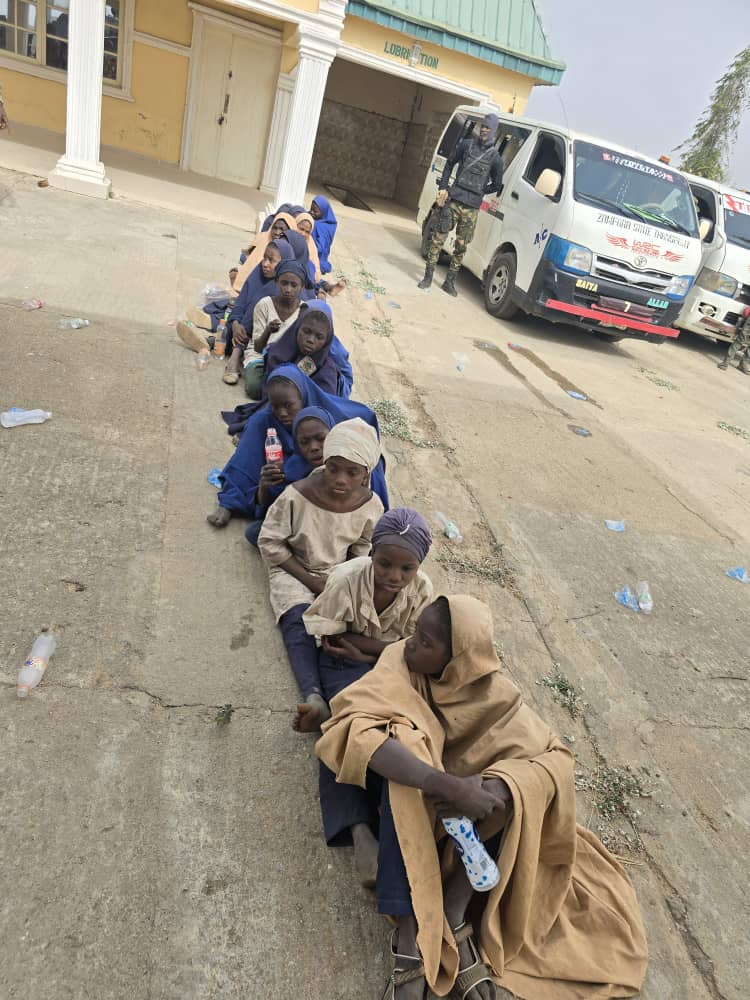My Muslim friends know how much I enjoy Ramadan Iftar—the sumptuous meal with which they break their fast in the evening. I am therefore regularly invited to their homes to feast. There are even places where I have a ‘permanent seat’ at the table. Over the years, Hajiya Kulu Abba Kyari, Princess Hassana Onoyiveta and Hajiya Zulahatu Adamu Waziri have also made it part of their annual Ramadan agenda to send Kunu, Kose (Akara) and other delicacies to my family.
But I had an Iftar with a difference on Tuesday atthe Al-Habibiyyah Mosque in Guzape, Abuja where I joined in serving packs of jollof rice and eggs to more than 2,000 underprivileged young men. It was done in a seamless manner that did not take away their dignity, thanks to the visionary leadership of Imam Fuad Adeyemi. But I don’t want to get ahead of myself.
In 2024, according to a 29 January publication of the World Bank, “food security is likely to remain one of the critical challenges for the world to face.” Anticipating this problem, putting in place the necessary structures and identifying sufficient resources, the World Bank added, are “essential for effective policymaking and developing responsive plans.” Unfortunately, there are no indications that Nigerian policymakers anticipated the current challenge of hunger, which has been worsened by government’s reforms on foreign exchange rates and petrol subsidy removal. Even if we assume the government anticipated the dire situation, it is doubtful that it has put in place serious measures to tackle the challenge. Today, we live in a country where desperate citizens are now needlessly dying in the process of trying to find something to eat.
Last Sunday in the Bauchi State capital, no fewer than four people, including women, lost their lives along with scores of others who were injured in a stampede during food distribution at Shafa Holdings Company Plc. Ahmed Wakil, the Bauchi State Police Command spokesperson, who explained that the tragedy occurred when hundreds of young men and women scampered for the food being distributed, also confirmed that of the five people rushed to the Abubakar Tafawa Balewa Teaching Hospital Bauchi following the stampede, “four were confirmed dead by medical doctors.”
Less than 48 hours before the Bauchi tragedy, two female students at the Nasarawa State University in Keffi also died while 17 other students were injured following a stampede inside a hall on the campus where bags of rice were kept. At the instance of Governor Abdullahi Sule, students of tertiary institutions in the state were to receive two 7.5kg bags of rice and NGN5,000 each as ‘palliatives’ to cushion the effect of the difficult times in the country. The explanation provided by the National President of the Nasarawa State Students Association, Yunusa Yusuf Baduku, on last Friday’s stampede, depicts a high level of desperation. “After our arrangement for the distribution of palliatives to the students that was to be held at the university’s convocation square, they (students) suddenly arrived at the venue in their numbers and overpowered security,” Baduku told reporters. “They (the students) broke through the gate into the hall where the bags of rice were to be shared. Unfortunately, most of our female students sustained injuries. We rushed several students to the school clinic and Federal Medical Centre Keffi. I learned that two female students died from suffocation.”
This same desperation accounted for the death of seven people in Lagos State on 23 February during the distribution of 25kg bags of rice at a discounted price of N10,000 by the Nigeria Customs Service (NCS). Three days earlier, the NCS had announced that it would facilitate the direct disposal of food items forfeited to the federal government at NCS’s zonal headquarters in Yaba. That was what attracted the crowd. “Unforeseen challenges arose when we ran out of stock and announced the continuation of the exercise the following day, leading to a regrettable outcome,” spokesperson for the service, Abdullahi Maiwada, explained. “The crowd became desperate and charged through our barricades in search of rice bags inside emptied containers. In the stampede that ensued, some fatalities and injuries were regrettably recorded.”
Before I continue, it is important to stress that food insecurity is a global challenge. For instance, statistics from the 2022 Household Food Security in the United States released by the Department of Agriculture reveals that 44 million American people are food insecure while 49 million turned to food programmes in 2022. But we must accept the reality of our dire situation as a nation. In part because of recent economic reform policies, the Consumer Price Index (CPI) , which measures the rate of change in prices of goods and commodities, increased to 31.70 per cent in February compared to 29.90 per cent in the preceding month. Perhaps more troubling, going by the figures from the National Bureau of Statistics (NBS), is that food inflation rose to 37.92 per cent in February 2024 up from 35.41 per cent in the preceding month and from 24.35 per cent in February last year. In a country where citizens, on the average, spend about 60 per cent of their incomes on food and where more than 40 per cent live below the income poverty line, the continuous spike in food inflation should be concerning to policy makers and the rest of us.
Ordinarily, one would expect a sense of urgency, especially from the federal government, but nothing seems to have changed in Abuja. According to a report by The Cable, an online newspaper, as many as 40 of the 63 government-owned enterprises have allocations for ‘welfare packages’ in their 2024 budgets. The sums so allocated by ten of these agencies collectively amount to N83,495,293,002. Here is the breakdown according to the newspaper: Nigerian Upstream Petroleum Regulatory Commission (NUPRC), N50,426,691,710.60; Federal Inland Revenue Service (FIRS), N13,617,615,408; National Agency For Food And Drugs Administration Control (NAFDAC), N6,673,059,750; Nigeria Deposit Insurance Corporation (NDIC), N5,319,679,087.60; Standard Organisation of Nigeria (SON), N2,512,603,454; Nigeria Export Processing Zones Authority (NEPZA), N1,224,697,757; Nigerian Communications Commission (NCC), N953,729,000; Joint Admissions and Matriculation Board (JAMB), N950,000,000; Nigerian Meteorological Agency (NIMET), N925,976,298; Nigerian Immigration Service (NIS), N891,240,537. These welfare packages are mostly to augment the already hefty remunerations of just a few thousand staff members of these agencies and should not be confused with their salaries, allowances, pension and health insurance benefits. What this shows is that government can find the money within its present budget to provide succour to the increasing number of our citizens reeling under the pangs of hunger. If properly structured, the N83 billion welfare packages for a few staff of the ten agencies can make a world of difference to millions of people who would otherwise go to bed hungry. That much I learnt from the Al-Habibiyyah Mosque in Abuja on Tuesday.
Based on the reports I had read about the ‘Al-Habibiyyah Society Food Programme’ and how organised they are, I decided to visit last Tuesday without notice. I arrived at exactly 6.15PM and mingled with the crowd within the mosque’s premises. Shortly before 7PM, I sought to see the Imam, Fuad Adeyemi, who I was meeting for the first time. He was most gracious to me. I was surprised to learn that the money with which they feed thousands of people daily for 30 days come from donations by individuals, including in some instances non-Muslims. But there are now three challenges. One, due to the economic situation in the country, the number of their donors (as well as quantum of donations) has reduced. Two, the number of people who come for the free meals (and since nobody is asked any question it stands to reason that beneficiaries cannot all be Muslims) has increased. Three, according to the Imam, the prices of foodstuffs have also dramatically increased. That was how they moved from chicken and beef to egg as the protein component for the jollof rice.
With the Maghrib prayer (to mark the end of the day’s fasting) concluded Tuesday evening, one of the volunteers (a prominent man who had identified me), asked whether I would like to join in serving the food. I didn’t hesitate. The mosque has seven doors. Six were used as serving points. I led the group that served in one. All the people to be served sat in rows and filed in a single line when it was their turn. Distributing the food packs was seamless and efficient. It took just 18 minutes from the beginning to the end to serve about 2,200 people. At the end, there were two other lines by the mosque’s main entrance door. That was for the ‘Oliver Twists’ who desired a second ration from whatever remained after everybody had been served.
Although the food bank has been on for the past 20 years, it wasn’t part of Adeyemi’s original plan. He had set out to teach mostly well-heeled Muslims and others how to read the Quran in Arabic within four months. The informal academy later expanded into regular Friday prayers, then reflections and teachings during Ramadan. The idea of the food bank started marinating in 2003 after a group of women said they needed food to feed their families. Members of the society taxed themselves to support the women. The Imam then set up a committee on how to formalise providing food for the needy during Ramadan, headed by Kunmi Olayiwola, (a former senior colleague at Concord newspaper now an insurance broker.) In 2005, the Imam (who graduated with a master’s degree from the Nigerian Defence Academy) was able to clarify the plan while participating in the American State Department International Visitors’ Leadership Program in Washington DC. After he encountered a Santiago-based Catholic Reverend Father offering a food bank to the needy. Back home, during the Ramadan of that year, the Al-Habibiyyah Food Bank became formalised. From a few hundreds, the beneficiaries have expanded to thousands who are served hot meals daily for the 29 or 30 days of Ramadan.
I commend Imam Adeyemi for what he is doing and call on public-spirited individuals and corporate organisations to support his efforts so he can expand their food programme beyond the Ramadan period. More importantly, relevant authorities should learn a lesson in food distribution logistics at the Mosque. You don’t have to dehumanise people or put their lives at risk just because you want to give them food – whether raw or already cooked.
I hope the authorities in Abuja and the 36 states are paying attention to developments around us. The United Nations World Food Programme has projected that no fewer than 26.5 million Nigerians will “face acute hunger in the June-August 2024 lean season.” It is described as “a staggering increase from the 18.6 million people food insecure at the end of 2023” even as “rising inflation, high food prices and food shortages across the country have left millions of people in Nigeria struggling to feed themselves.”
Enough said!
Senegal, Faye and Destiny
Bassirou Diomaye Faye will on Tuesday be sworn in as the 5th President of Senegal. But it was the structure of his mentor, Ousmane Sonko, that has catapulted him to power. Sonko, a popular opposition figure and leader of Patriots of Senegal (PASTEF), had been disqualified from contesting on account of a contrived defamation conviction. He was subsequently detained with his 44-year-old protégé and tax inspector, Faye for leading the street protest that upended President Macky Sall’s attempt to self-perpetuate in office. With both ‘dissidents’ released a few days to the election and PASTEF banned, Faye contested as an independent with the endorsement of Sonko. The rest is now history.
It is remarkable that twice, the people of Senegal have thwarted attempts by an incumbent president to elongate his tenure. In 2012, President Abdoulaye Wade, then 85 (will be 97 in July) was defeated by Sall, after the former had tampered with the two-term limit, using the constitutional court. This time, the same court upended President Macky Sall’s move to postpone the election. Samson Itodo, Executive Director YIAGA Africa, a civil society group, has summarised the three significant lessons from the election in a brilliant manner. The first one is the strength of critical institutions in Senegal, a country that has never witnessed a military coup since independence. “Despite Macky Sall’s insistence on extending his tenure and changing the date of elections, the constitutional council stood up against the president and said, ‘no we must respect the constitution and the constitution provided that by April you ought to leave office’”, Itodo said.
The second lesson identified by Itodo is that of leadership anchored on public trust. “Leaders need to learn that when your time has come to an end, please leave because you are not the only one who can solve the problems.” I want to put the third lesson more graphically: A people united can never be defeated. “One of the things we celebrate about Senegal is the resilience of the people,” Itodo said. “The people of Senegal have taught us as people that we have power in a democracy, we just need to use that power and use it consistently.”
I congratulate the people of Senegal, but Faye must also understand that as the youngest elected president in Africa, he carries not only the hope of his people but that of a generation in a continent where there has long been an assumption that the wisdom of Solomon had something to do with the age of Methuselah!
The Message of Easter
Like it happened two years ago, Christians will mark Easter at a period Muslims are observing the Ramadan fast and I want to repeat a story that best exemplifies the message of Easter. It was reportedly told by the late Charles Wendell Colson, a former special counsel to President Richard Nixon, who resigned from office in the wake of the Watergate scandal in 1974. Colson was also jailed for his role in that scandal but following that experience, he became an Evangelical Christian leader who founded Prison Fellowship International.
According to Colson’s story, during the Second World War, a group of American prisoners of war (POWs) were made to work in a prison camp. One evening, 20 POWs were lined up after the day’s work and when the shovels handed them were counted by the prison guard, only 19 were found. In rage, the prison guard demanded to know which of the prisoners did not bring his shovel back.
When no one responded, the guard drew his gun and said he would shoot five men if the guilty prisoner did not step forward. After a moment of tense silence, a young soldier, aged 19, stepped forward with his head bowed down. The guard grabbed him and shot him in the head. He then turned to warn the others that they would suffer a similar fate if they exhibited the same carelessness. When the prison guard left, the 19 remaining POWs gathered the shovels only to discover there were 20. The guard had miscounted.
In his commentary on the story, Pastor John Piper wrote: “Can you imagine the emotions that must have filled their (the remaining 19 POWs) hearts as they knelt over his (their slain colleague) body? In the five or ten seconds of silence, the boy had weighed his whole future in the balance—a future wife, an education, a new truck, children, a career, fishing with his dad—and he chose death so that others might live…”
As I wish my Christian brethren Happy Easter, may the resurrection power of our Lord Jesus Christ avail for us all.
You can follow me on my X (formerly Twitter) handle, @Olusegunverdict and on www.olusegunadeniyi.com.





